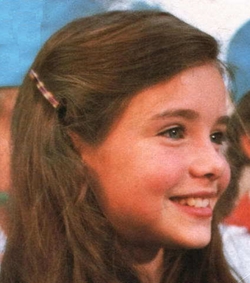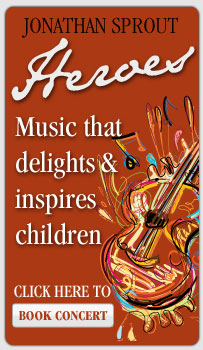
Samantha Smith (1972-1985) was a bright and expressive schoolgirl whose optimism warmed the hearts of millions around the world. At the age of 10, when the United States and the Soviet Union appeared to be on the brink of nuclear war, she wrote a letter of peace to Soviet leader Yuri Andropov. His warm response and her two-week journey to his country inspired countless Americans and Soviets to rethink their hostile views of each other. As a powerful symbol of hope and “America's youngest ambassador for peace,” she helped create an atmosphere of love, respect, and joy. Tragically, her life was cut short at the age of 13 when she and her father died in a plane crash. She taught the world an important lesson: If people try hard enough, they can get along.
The people of the world seem more like people in my own neighborhood. I think they are more like me than I ever realized.—Samantha Smith
Powerful
(By Jonathan Sprout and Dave Kinnoin)
A ten-year-old girl from the state of Maine
Reads the scary news, wants her mom to explain
About nuclear war.
“They say the USSR
Keeps building bombs that can travel this far.
How come? And what on earth for?
Why can’t we get along, get along together?
Please write. Write someone a letter.”
Refrain: Powerful! Powerful!
Now it may be hard to see
Sometimes little things can be powerful.
Her mom tells Samantha what she already knew:
“A letter would be better if it came from you.”
So she gathers her thoughts to say what she meant.
She writes, “I’ve been worrying. It isn’t right.
Why do you want war? We should never fight.”
Off to Russia the letter is sent.
Four or more months go by.
Patience. There is no reply.
Refrain
Bridge: Peace can be grown from the tiniest seed.
Andropov writes back and the world gets to read:
“Dear Samantha, we are just like you.
We do not want war. We are peaceful, too.
Please be our guest and visit us here.”
There in the Soviet Union, Samantha’s name
Becomes a symbol of hope. She finds worldwide fame—
A girl on a quest, a peace pioneer.
And as she makes her friends behind the Iron Curtain,
She learns one thing is for certain:
Refrain She is powerful! Powerful!
Now it may be hard to see
Sometimes little girls can be powerful.
©2014 Kanukatunes (ASCAP) and Song Wizard Music (ASCAP)
Lead vocal: Jonathan Sprout
Drum programming, keyboards, and balalaika programming: Joe Mennonna
Intro music box, harmonica and percussion: Jimmy Hammer
Bass: Al Renino
Guitars: Leslie Chew, Jonathan Sprout, and Jimmy Hammer
Background vocals: Susie Stevens, Jimmy Hammer, and Lucyane Bouchardet
Key Words:
Optimism ~ hopefulness and confidence; expecting the best. Samantha didn’t understand why the US and Soviet Union could not get along. She was hopeful, and truly believed, the two countries could be friends.
Soviet Union ~ (also USSR or Russia) a former communist country in eastern Europe and northern Asia; included Russia and 14 other republics; established in 1922 and officially dissolved in 1991. The Soviet Union was considered an enemy of the United States during Samantha’s lifetime.
Nuclear war ~ a conflict using weapons whose explosive power is created by a nuclear reaction. For Samantha and other US children, there was a fear that a devastating war could occur between the US and Soviet Union. War never did break out between the countries. This period of hostility was called the Cold War.
Yuri Andropov ~ the leader of the Soviet Union from 1982-1984. Samantha wrote a letter to him asking, “Why do you want war?” Andropov’s reply to her stated that the USSR did not want war, and he invited her to come visit his country.
Hostile ~ unfriendly; relating to an enemy. During this time, the people of the US and the Soviet Union were fearful of each other. Something called “the iron curtain” separated the USSR from the western world. It wasn’t a real curtain, but it was an ideological barrier that prevented the free exchange of ideas and information.
Ambassador ~ someone who represents their country and tries to promote goodwill between nations. Samantha was described as “an ambassador for peace” and “a peace pioneer” because she wanted the US and Soviet Union to be friends.


